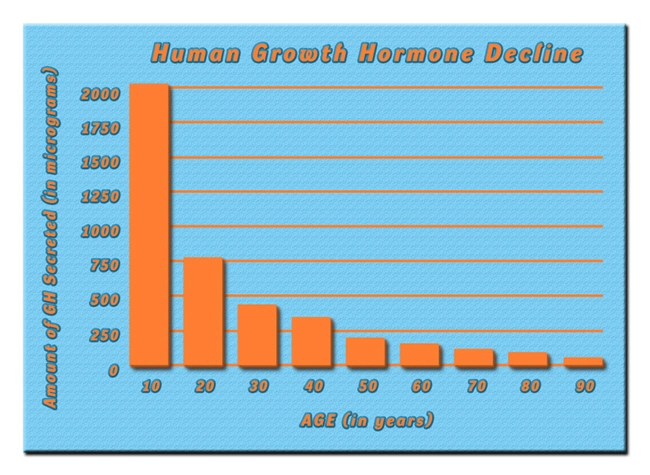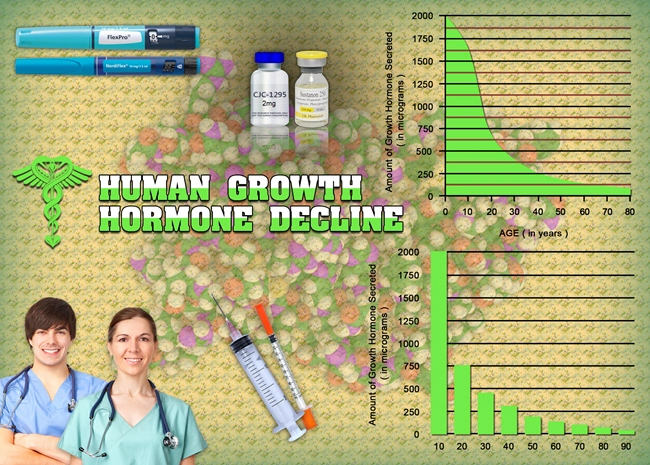
Introduction
Erectile dysfunction (ED) is a prevalent condition among American males, affecting millions and often leading to significant distress and a reduced quality of life. While lifestyle factors, psychological conditions, and underlying medical issues are well-known contributors to ED, recent research has begun to unravel the role of genetic factors in the development and treatment of this condition. Understanding the genetic underpinnings of ED can pave the way for more personalized and effective treatment strategies, tailored to the individual's genetic profile.
The Genetic Basis of Erectile Dysfunction
Genetic research has identified several genes that may influence the risk of developing ED. Variations in genes involved in the nitric oxide pathway, which is crucial for achieving and maintaining an erection, have been linked to an increased susceptibility to ED. For instance, polymorphisms in the endothelial nitric oxide synthase (eNOS) gene have been associated with a higher risk of ED. Similarly, genes related to the regulation of blood flow and vascular health, such as those encoding for angiotensin-converting enzyme (ACE), have also been implicated in ED.
Impact of Genetic Variability on Treatment Efficacy
The efficacy of ED treatments can vary significantly among individuals, and genetic factors may play a crucial role in these differences. For example, phosphodiesterase type 5 inhibitors (PDE5Is), such as sildenafil and tadalafil, are commonly prescribed for ED. However, not all men respond equally to these medications. Genetic variations in the PDE5 gene itself can influence how an individual metabolizes and responds to PDE5Is, potentially explaining the variability in treatment outcomes.
Moreover, genetic polymorphisms in drug-metabolizing enzymes, such as cytochrome P450 (CYP) enzymes, can affect the pharmacokinetics of ED medications. For instance, variations in the CYP3A4 and CYP3A5 genes, which are involved in the metabolism of PDE5Is, can lead to differences in drug clearance and efficacy. Understanding an individual's genetic profile can help clinicians predict their response to specific treatments and adjust dosages accordingly, enhancing treatment success.
Personalized Medicine: The Future of ED Treatment
The concept of personalized medicine, which involves tailoring medical treatment to the individual characteristics of each patient, holds great promise for the management of ED. By integrating genetic information into clinical practice, healthcare providers can develop more targeted and effective treatment plans. For instance, genetic testing could identify men who are less likely to respond to standard PDE5Is, allowing clinicians to consider alternative therapies, such as alprostadil or vacuum erection devices, from the outset.
Furthermore, genetic insights can inform the development of novel therapeutic agents designed to address specific genetic pathways implicated in ED. As research progresses, we may see the emergence of gene-based therapies that directly target the underlying genetic causes of ED, offering new hope for those who do not respond to current treatments.
Challenges and Considerations
While the potential of genetic-based personalized treatment for ED is exciting, several challenges must be addressed. The cost and accessibility of genetic testing remain significant barriers for many American males. Additionally, the ethical implications of genetic testing, including privacy concerns and the potential for genetic discrimination, must be carefully considered.
Moreover, the field of pharmacogenomics, which studies how genes affect a person's response to drugs, is still evolving. More research is needed to fully understand the complex interplay between genetic factors and ED treatment outcomes. Collaborative efforts between geneticists, urologists, and pharmacologists will be essential to advance this field and translate genetic discoveries into practical clinical applications.
Conclusion
The integration of genetic factors into the management of erectile dysfunction represents a significant step forward in personalized medicine. By understanding the genetic basis of ED and its impact on treatment efficacy, healthcare providers can offer more tailored and effective interventions to American males suffering from this condition. As we continue to unravel the genetic code, the future of ED treatment looks promising, with the potential to improve outcomes and enhance the quality of life for countless individuals.
Contact Us Today For A Free Consultation
Dear Patient,
Once you have completing the above contact form, for security purposes and confirmation, please confirm your information by calling us.
Please call now: 1-800-380-5339.
Welcoming You To Our Clinic, Professor Tom Henderson.

- Exploring New Horizons: Overcoming Erectile Dysfunction to Rekindle Romantic Intimacy [Last Updated On: February 15th, 2025] [Originally Added On: February 15th, 2025]
- Embarking on the Journey of Triumph: A Comprehensive Guide to Conquer Erectile Dysfunction [Last Updated On: February 25th, 2025] [Originally Added On: February 25th, 2025]
- Triumph Over Trials: Overcoming Battles with Erectile Dysfunction [Last Updated On: February 26th, 2025] [Originally Added On: February 26th, 2025]
- Alchemy of Attraction: Grasping the Biomechanical Puzzle of Erectile Dysfunction [Last Updated On: February 27th, 2025] [Originally Added On: February 27th, 2025]
- Breaking the Stigma: Understanding and Overcoming Erectile Dysfunction [Last Updated On: February 28th, 2025] [Originally Added On: February 28th, 2025]
- Unraveling Misconceptions: A Comprehensive Analysis of Erectile Dysfunction [Last Updated On: February 28th, 2025] [Originally Added On: February 28th, 2025]
- Breaking Through the Shadows: Unveiling the Psychological Implications of Erectile Dysfunction [Last Updated On: March 1st, 2025] [Originally Added On: March 1st, 2025]
- The Pill or The Promise: Unveiling The Comparative Efficiency of Erectile Dysfunction Medications [Last Updated On: March 2nd, 2025] [Originally Added On: March 2nd, 2025]
- Enhancing Intimacy in Modern Relationships: The Role of Medical Interventions, Psychological Counseling, and Lifestyle Changes in Improving Sexual Health [Last Updated On: March 3rd, 2025] [Originally Added On: March 3rd, 2025]
- Navigating the Path to Recovery: Understanding and Managing Erectile Dysfunction [Last Updated On: March 3rd, 2025] [Originally Added On: March 3rd, 2025]
- Comprehensive Guide to Understanding and Treating Erectile Dysfunction [Last Updated On: March 4th, 2025] [Originally Added On: March 4th, 2025]
- Exploring the Psychological Impact of Erectile Dysfunction on Men and Relationships [Last Updated On: March 5th, 2025] [Originally Added On: March 5th, 2025]
- Understanding Erectile Dysfunction: Causes, Treatment, and Medication Efficacy [Last Updated On: March 6th, 2025] [Originally Added On: March 6th, 2025]
- The Evolution of Erectile Dysfunction Treatments: From Ancient Remedies to Modern Innovations [Last Updated On: March 7th, 2025] [Originally Added On: March 7th, 2025]
- Revolutionizing Erectile Dysfunction Treatment: Innovations, Telemedicine, and Personalized Care [Last Updated On: March 8th, 2025] [Originally Added On: March 8th, 2025]
- The Vascular Role in Erectile Dysfunction: Understanding, Treatment, and Holistic Management [Last Updated On: March 9th, 2025] [Originally Added On: March 9th, 2025]
- Unveiling the Battle: Testosterone's Impact on Erectile Dysfunction in American Men [Last Updated On: March 12th, 2025] [Originally Added On: March 12th, 2025]
- Lifestyle Changes to Combat Erectile Dysfunction in American Males [Last Updated On: March 13th, 2025] [Originally Added On: March 13th, 2025]
- Overcoming Erectile Dysfunction: Causes, Treatments, and Inspiring Recovery Stories [Last Updated On: March 13th, 2025] [Originally Added On: March 13th, 2025]
- Unveiling the Truth: Dispelling Myths About Erectile Dysfunction in American Men [Last Updated On: March 15th, 2025] [Originally Added On: March 15th, 2025]
- Exploring Alternative Therapies for Erectile Dysfunction in American Males [Last Updated On: March 17th, 2025] [Originally Added On: March 17th, 2025]
- Telemedicine's Role in Managing Erectile Dysfunction: Benefits and Challenges [Last Updated On: March 18th, 2025] [Originally Added On: March 18th, 2025]
- Innovative Therapies and Technology Transforming Erectile Dysfunction Treatment in the U.S. [Last Updated On: March 18th, 2025] [Originally Added On: March 18th, 2025]
- Erectile Dysfunction: Understanding, Treating, and Empowering American Men [Last Updated On: March 19th, 2025] [Originally Added On: March 19th, 2025]
- Global Approaches to Erectile Dysfunction: Treatments Compared for American Males [Last Updated On: March 19th, 2025] [Originally Added On: March 19th, 2025]
- Erectile Dysfunction: Couples' Guide to Understanding, Treating, and Overcoming ED Together [Last Updated On: March 19th, 2025] [Originally Added On: March 19th, 2025]
- Managing Erectile Dysfunction: Medical, Lifestyle, and Mental Health Approaches [Last Updated On: March 19th, 2025] [Originally Added On: March 19th, 2025]
- Stress, Sleep, and ED: Strategies for American Men to Enhance Sexual Health [Last Updated On: March 19th, 2025] [Originally Added On: March 19th, 2025]
- Boosting Libido and Combating ED with Diet and Exercise: A Guide for American Men [Last Updated On: March 20th, 2025] [Originally Added On: March 20th, 2025]
- Managing Erectile Dysfunction: A Holistic Guide for American Men [Last Updated On: March 21st, 2025] [Originally Added On: March 21st, 2025]
- Exploring Treatments for Erectile Dysfunction: Pills, Injections, and Beyond [Last Updated On: March 21st, 2025] [Originally Added On: March 21st, 2025]
- Natural Remedies and Lifestyle Changes to Combat Erectile Dysfunction in American Men [Last Updated On: March 21st, 2025] [Originally Added On: March 21st, 2025]
- Erectile Dysfunction in the U.S.: Prevalence, Impacts, and Holistic Management Approaches [Last Updated On: March 22nd, 2025] [Originally Added On: March 22nd, 2025]
- Erectile Dysfunction: Causes, Treatments, and Lifestyle Impact on American Men [Last Updated On: March 23rd, 2025] [Originally Added On: March 23rd, 2025]
- Erectile Dysfunction: Costs, Treatments, and Financial Management Strategies for American Males [Last Updated On: March 23rd, 2025] [Originally Added On: March 23rd, 2025]
- Counseling's Vital Role in Treating Erectile Dysfunction: A Comprehensive Approach [Last Updated On: March 23rd, 2025] [Originally Added On: March 23rd, 2025]
- Vascular Health's Crucial Role in American Males' Erectile Function [Last Updated On: March 23rd, 2025] [Originally Added On: March 23rd, 2025]
- Exercise as a Holistic Approach to Managing Erectile Dysfunction in American Men [Last Updated On: March 23rd, 2025] [Originally Added On: March 23rd, 2025]
- CBT: A Powerful Therapy for American Males with Erectile Dysfunction [Last Updated On: March 24th, 2025] [Originally Added On: March 24th, 2025]
- Celebrity Influence Boosts Awareness and Treatment of Erectile Dysfunction in Men [Last Updated On: March 24th, 2025] [Originally Added On: March 24th, 2025]
- Erectile Dysfunction: From Taboo to Treatable - Media and Medical Insights for American Men [Last Updated On: March 24th, 2025] [Originally Added On: March 24th, 2025]
- Restorative Sleep: A Key to Enhancing Erectile Function in American Males [Last Updated On: March 24th, 2025] [Originally Added On: March 24th, 2025]
- Male Anatomy and Erectile Dysfunction: Causes, Diagnosis, and Treatment Strategies [Last Updated On: March 24th, 2025] [Originally Added On: March 24th, 2025]
- Work Stress and Its Impact on Men's Sexual Health: Understanding ED [Last Updated On: March 24th, 2025] [Originally Added On: March 24th, 2025]
- Personalized Approaches to Treating Erectile Dysfunction in American Men [Last Updated On: March 24th, 2025] [Originally Added On: March 24th, 2025]
- Erectile Dysfunction's Impact on Self-Esteem: Strategies for American Males to Rebuild Confidence [Last Updated On: March 24th, 2025] [Originally Added On: March 24th, 2025]
- Understanding and Overcoming Performance Anxiety and Erectile Dysfunction in Men [Last Updated On: March 25th, 2025] [Originally Added On: March 25th, 2025]
- Transformative ED Treatments: Success Stories and Innovations Across U.S. Clinics [Last Updated On: March 25th, 2025] [Originally Added On: March 25th, 2025]
- Chronic Illness and ED: Understanding Links and Managing Sexual Health in American Males [Last Updated On: March 25th, 2025] [Originally Added On: March 25th, 2025]
- Nerve Damage and Erectile Dysfunction: Causes, Diagnosis, and Treatment Options [Last Updated On: March 25th, 2025] [Originally Added On: March 25th, 2025]
- Erectile Dysfunction: An Early Indicator of Cardiovascular Disease in American Males [Last Updated On: March 25th, 2025] [Originally Added On: March 25th, 2025]
- Wearable Technology: A New Frontier in Managing Erectile Dysfunction [Last Updated On: March 25th, 2025] [Originally Added On: March 25th, 2025]
- Erectile Dysfunction: Navigating Impact, Communication, and Recovery in Relationships [Last Updated On: March 25th, 2025] [Originally Added On: March 25th, 2025]
- Essential Nutrients for Enhancing Sexual Health and Combating Erectile Dysfunction [Last Updated On: March 25th, 2025] [Originally Added On: March 25th, 2025]
- Cutting-Edge ED Treatments: Shockwave, Gene, and Stem Cell Therapies Offer New Hope [Last Updated On: March 25th, 2025] [Originally Added On: March 25th, 2025]
- Managing Erectile Dysfunction: Communication, Intimacy, and Professional Help for American Men [Last Updated On: March 26th, 2025] [Originally Added On: March 26th, 2025]
- PDE5 Inhibitors: Revolutionizing Erectile Dysfunction Treatment in American Males [Last Updated On: March 26th, 2025] [Originally Added On: March 26th, 2025]
- Erectile Dysfunction and Mental Health: Navigating Depression and Anxiety in American Men [Last Updated On: March 26th, 2025] [Originally Added On: March 26th, 2025]
- Revolutionizing Men's Health: Advanced Treatments for Erectile Dysfunction [Last Updated On: March 26th, 2025] [Originally Added On: March 26th, 2025]
- New Medications and Therapies Revolutionizing Erectile Dysfunction Treatment [Last Updated On: March 26th, 2025] [Originally Added On: March 26th, 2025]
- Understanding Erections and Managing Erectile Dysfunction in American Men [Last Updated On: March 27th, 2025] [Originally Added On: March 27th, 2025]
- Navigating Erectile Dysfunction: Rebuilding Romance and Intimacy in Relationships [Last Updated On: March 27th, 2025] [Originally Added On: March 27th, 2025]
- Natural Remedies for Erectile Dysfunction: Ginseng, L-Arginine, and Horny Goat Weed [Last Updated On: March 27th, 2025] [Originally Added On: March 27th, 2025]
- Managing Performance Anxiety and ED: Strategies for American Men [Last Updated On: March 28th, 2025] [Originally Added On: March 28th, 2025]
- Enhancing Sexual Health: Diet, Lifestyle, and Medical Strategies for American Men [Last Updated On: March 28th, 2025] [Originally Added On: March 28th, 2025]
- Exploring Non-Drug Treatments for Erectile Dysfunction in American Men [Last Updated On: March 28th, 2025] [Originally Added On: March 28th, 2025]
- Holistic Approaches to Overcome Erectile Dysfunction in American Males [Last Updated On: March 28th, 2025] [Originally Added On: March 28th, 2025]
- Erectile Dysfunction: Causes, Management Strategies, and Expert Health Tips [Last Updated On: March 28th, 2025] [Originally Added On: March 28th, 2025]
- Physical Therapy: A Promising Approach to Treating Erectile Dysfunction in American Males [Last Updated On: March 29th, 2025] [Originally Added On: March 29th, 2025]
- Erectile Dysfunction and Prostate Health: Understanding the Vital Connection for Men [Last Updated On: March 30th, 2025] [Originally Added On: March 30th, 2025]
- Erectile Dysfunction: Holistic Approaches for American Men's Sexual Health [Last Updated On: March 30th, 2025] [Originally Added On: March 30th, 2025]
- Navigating Erectile Dysfunction: A Comprehensive Guide to Consultations and Treatment [Last Updated On: March 31st, 2025] [Originally Added On: March 31st, 2025]
- Managing Erectile Dysfunction: The Power of Positivity and Mental Strategies [Last Updated On: April 1st, 2025] [Originally Added On: April 1st, 2025]
- Erectile Dysfunction: Understanding Causes, Breaking Stigma, and Exploring Modern Treatments [Last Updated On: April 3rd, 2025] [Originally Added On: April 3rd, 2025]
- Transforming ED into Deeper Intimacy: A Journey for American Couples [Last Updated On: April 4th, 2025] [Originally Added On: April 4th, 2025]
- Erectile Dysfunction: Personalized Treatment Approaches and Dosage Considerations [Last Updated On: April 5th, 2025] [Originally Added On: April 5th, 2025]
- Future of ED Treatment: Innovations in Drug Delivery and Technology [Last Updated On: April 5th, 2025] [Originally Added On: April 5th, 2025]
- Erectile Dysfunction: From Research Innovations to Practical Solutions and Future Directions [Last Updated On: April 6th, 2025] [Originally Added On: April 6th, 2025]
- Erectile Dysfunction Medications: Enhancing Confidence and Performance in American Males [Last Updated On: April 9th, 2025] [Originally Added On: April 9th, 2025]
- Diabetes and Erectile Dysfunction: Understanding Links, Diagnosis, and Management Strategies [Last Updated On: April 10th, 2025] [Originally Added On: April 10th, 2025]









